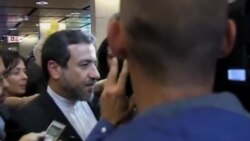GENEVA —
Negotiators say two days of nuclear talks in Geneva between Iran's new government and the United Nations contact group achieved new levels of specificity and openness, but they will not reveal details and say much work remains to be done.
There were many firsts in these talks - including the first meeting with Iran's new government, the first agreement on a joint statement, and what officials on both sides called an unprecedented level of detailed, open and candid discussions.
They agreed that experts on nuclear issues and economic sanctions will begin meeting soon to go over the proposals Iran made here, and to prepare for another round of formal talks in just three weeks.
The joint statement calls the talks “substantive and forward looking,” and says the Iranian proposal presented on Tuesday was an “important contribution” that the six nations representing the U.N. Security Council will carefully consider.
The head of the U.N. team, European Union foreign affairs chief Catherine Ashton, said these were the most detailed discussions “by a long way” of a series of such meetings she has attended over the last three years.
“Our positions have been set out on a number of issues already. And I would say to you that you need to allow us the space to now really have the opportunity to move forward, if that proves possible," said Ashton.
She and her Iranian counterpart, Mohammed Javad Zarif, both declined to give any specifics on key topics in the talks, including Iran's stockpile of uranium enriched to near weapons grade, its continuing enrichment program and its desire for relief from international sanctions that have battered its economy. They said their silence is evidence of the seriousness of the talks.
After years of mistrust and hostility, a senior U.S. official said these were the kind of talks that could lead to an agreement.
2012
2013
Foreign Minister Zarif called the meetings “extensive and fruitful” and said he hopes they mark the start of a new phase in Iran's international relations that will end what he calls an “unnecessary crisis.”
“There are more important issues that we need to deal with. And the right of Iran to pursue nuclear technology for peaceful purposes, including enrichment, can, in fact, be exercised, with the necessary political will, without any proliferation concerns," said Zarif.
But amid the optimism, both sides emphasized that there are still disagreements on many points and that the issues are very complex and technical. Zarif called this the first step on a difficult road, and he said the journey will take time.
There were many firsts in these talks - including the first meeting with Iran's new government, the first agreement on a joint statement, and what officials on both sides called an unprecedented level of detailed, open and candid discussions.
They agreed that experts on nuclear issues and economic sanctions will begin meeting soon to go over the proposals Iran made here, and to prepare for another round of formal talks in just three weeks.
The joint statement calls the talks “substantive and forward looking,” and says the Iranian proposal presented on Tuesday was an “important contribution” that the six nations representing the U.N. Security Council will carefully consider.
The head of the U.N. team, European Union foreign affairs chief Catherine Ashton, said these were the most detailed discussions “by a long way” of a series of such meetings she has attended over the last three years.
“Our positions have been set out on a number of issues already. And I would say to you that you need to allow us the space to now really have the opportunity to move forward, if that proves possible," said Ashton.
She and her Iranian counterpart, Mohammed Javad Zarif, both declined to give any specifics on key topics in the talks, including Iran's stockpile of uranium enriched to near weapons grade, its continuing enrichment program and its desire for relief from international sanctions that have battered its economy. They said their silence is evidence of the seriousness of the talks.
After years of mistrust and hostility, a senior U.S. official said these were the kind of talks that could lead to an agreement.
Iran Nuclear Timeline
Recent Developments:2012
- January: IAEA confirms Iran is refining uranium to 20% fissile purity.
- February: UN inspectors end talks in Tehran without inspecting disputed military site at Parchin.
- April: Iranian President Mahmoud Ahmadinejad vows Iran will not surrender its nuclear rights.
- May: UN inspectors report they found find traces significantly upgraded uranium at an Iranian site.
- July: EU begins total ban on Iranian oil imports, US expands sanctions.
- September: IAEA demands access to Parchin, Iran calls EU sanctions "irresponsible."
- December: IAEA says it makes progress in talks with Iran. US imposes more sanctions.
2013
- January: Iran says it will speed up nuclear fuel work.
- February: Iran's supreme leader Ayatollah Ali Khamenei rejects direct nuclear talks with the U.S. Iran and world powers meet, agree to more talks.
- May: IAEA says Iran has expanded nuclear activity.
- September: Iranian President Hassan Rouhani says Iran will not seek weapons of mass destruction. Iran and world powers agree to resume nuclear talks.
- October: Iran holds talks with five permanent members of U.N. Security Council and Germany, more talks are set for November.
“There are more important issues that we need to deal with. And the right of Iran to pursue nuclear technology for peaceful purposes, including enrichment, can, in fact, be exercised, with the necessary political will, without any proliferation concerns," said Zarif.
But amid the optimism, both sides emphasized that there are still disagreements on many points and that the issues are very complex and technical. Zarif called this the first step on a difficult road, and he said the journey will take time.





